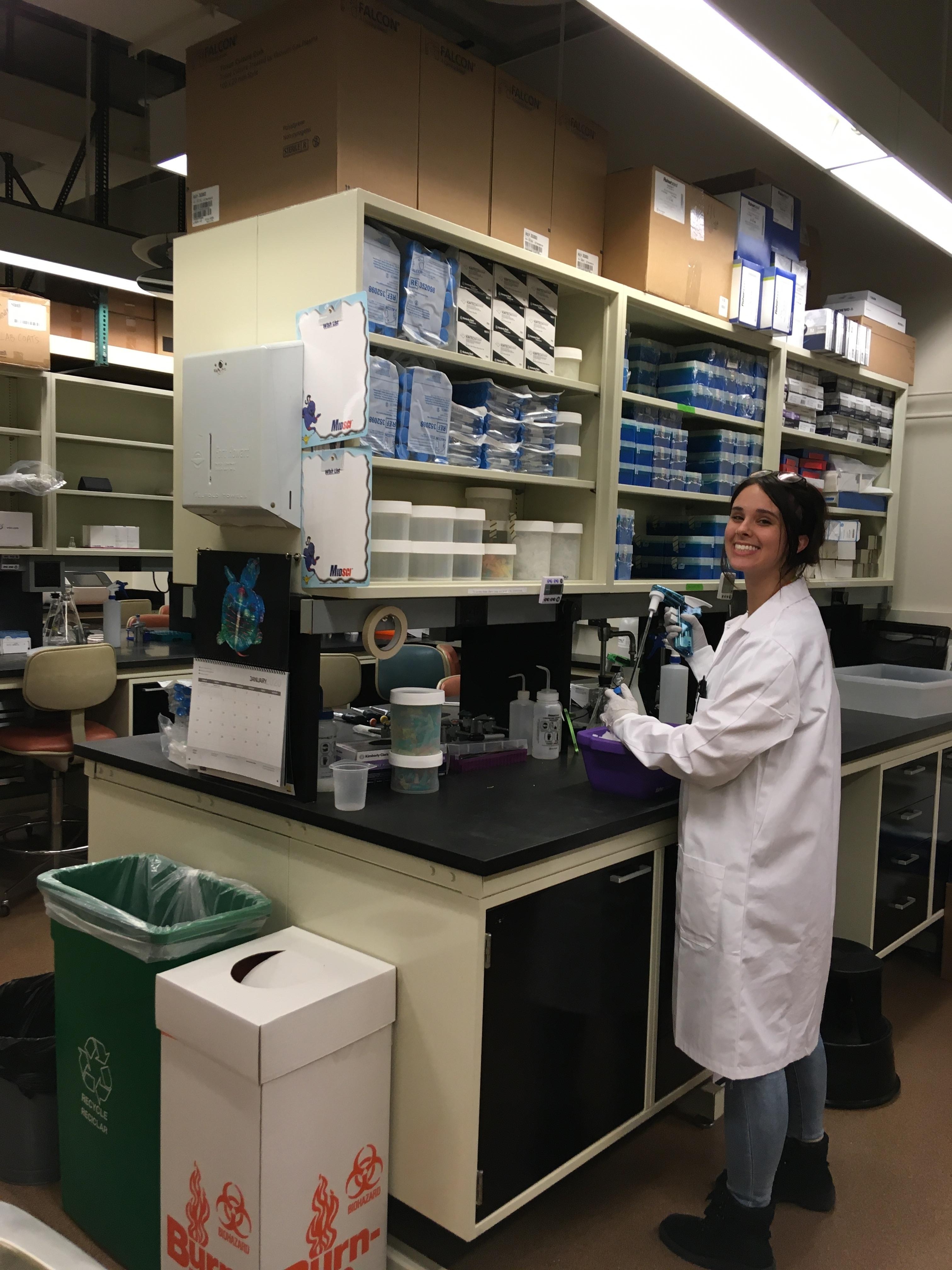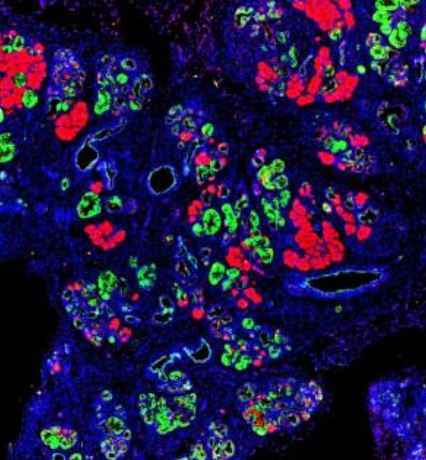
Samantha Tinsley

Training Group:
Molecular Signaling and Cancer Biology
Mentor / Lab:
Dr. Brittany Allen-Petersen
Specific Research Area / Project:
The role of PP2A-B56a in acinar-to-ductal metaplasia and initiation of pancreatic ductal adenocarcinoma
Lab / Personal work-related websites:
LabResearch Profile:
Pancreatic cancer is the 4th leading cause of cancer-related deaths in the United States with a 5-year survival rate of 10 percent. Presentation of pancreatic ductal adenocarcinoma (PDAC) in patients is associated with several genetic mutations, including oncogenic KRAS-activating mutations. These KRAS mutations are associated with nearly 100% of PDAC cases and contribute to cell survival and proliferation. While kinases are heavily studied in cancer, less is known about the critical role that phosphatases play in regulating cancer cell signaling. Protein phosphatase 2A (PP2A) is a major serine-threonine phosphatase that regulates many pathways including RAS/ERK pathways. The PP2A holoenzyme consists of 3 subunits: the scaffolding subunit (A), the catalytic subunit (C), and the regulatory subunit (B). The regulatory subunit of the PP2A complex is responsible for substrate specificity and consists of 16 different isoforms. Screening of PP2A B subunits indicates that B56α may serve as a tumor suppressor, however, its mechanism of action in PDAC remains unknown. My project focuses on how KRAS activating mutations effect PP2A phosphatase activity and expression of the B56α subunit, as well as the effects of B56α suppression on pancreatic cell identity and plasticity during pancreatic cancer initiation. These studies utilize genetic mouse models, 3D culturing techniques, and various molecular biology techniques to gain an in depth understanding of mechanisms that drive PP2A deregulation in cancer.

About Me:
One of the reasons I chose to pursue my studies at Purdue University is because the PULSe program allowed me to pursue Cancer Biology in an interdisciplinary way with collaboration across many departments. The PULSe program also has fairly small cohorts, allowing the experience of a small program at a large R1 research institution and Big Ten university!
The PULSe program has always catered to students needs, providing direction and support whenever needed. For example, the PULSe Graduate Student Organization (GSO) matches incoming students with older mentors to provide advice and aid in the transition into graduate school. I was so grateful for this program that I took the initiative to help run the First Year Mentoring program for the GSO for the following years. This mentoring program allows help from older students in addition to networking throughout departments and interdisciplinary perspectives on research.
I am currently still exploring what I would like to do with my degree and leaving my options open to explore. IGP and PULSe program continues to provide information I need to make an educated decision by frequently holds seminars, panels, and workshops pertaining to industry positions, academia, and non-canonical careers. For now, the training that I am receiving from my advisor, my committee, and the PULSe program in IGP are setting me up to ask important biological questions and approach them in innovative ways for a multitude of options after graduation.
Awards:
- Purdue Center for Cancer Research Travel Grant; Frederick N. Andrews Fellowship
Publications:
- Owens, J.L., Beketova, B., Liu, S., Tinsley, S.L., Asberry, A., Deng, X., Huang, J., Lin C,, Wan, J., and Hu, C.D. (2020). PRMT5 cooperates with pICln to function as a master epigenetic activator of DNA double-strand break repair genes. iScience. 23(1), 1007500.
- Lin, C.C., Lo, M.C., Moody, R., Jiang, H., Harouaka, R., Stevers, N., Tinsley, S.L., Gasparyan, M., Wicha, M., and Sun, D. (2018). Targeting LRP8 inhibits breast cancer stem cells in triple-negative breast cancer. Cancer Letters. 438, 165-173
- Moody, R.R., Lo, M.C., Meagher, J.L., Lin, C.C., Stevers, N.O., Tinsley, S.L., Jung, I., Matvekas, A., Stuckey, J.A., and Sun, D. (2018). Probing the interaction between the histone methyltransferase/deacetylase subunit RBBP4/7 and the transcription factor BCL11A in epigenetic complexes. Journal of Biological Chemistry. 293, 2125–2136.
- Lin, C.C., Lo, M.C., Moody, R.R., Stevers, N.O., Tinsley, S.L., and Sun, D. (2018). Doxycycline targets aldehyde dehydrogenase-positive breast cancer stem cells. Oncology Reports. 39(6), 3041-3047.
Presentations:
- Tinsley, S.L., Thoma, M.C., Narla, G., Sears, R.C.*, Allen-Petersen, B.L.* The role of PP2A-B56α in acinar-to-ductal metaplasia and initiation of pancreatic adenocarcinoma. PULSe Recruitment Weekend Poster Competition: Purdue University. (2020).
- Owens, J., Beketova, E., Tinsley, S., Asberry, A., Deng, X., and Hu, C.D. Mechanisms and targeting of therapy-resistant prostate cancer. Fall PULSe Retreat: Purdue University. (2019).
- Tinsley, S.L. and Wendt, M.K. Characterizing FGFR signaling in E0771 murine breast cancer cells. PULSe Spring Awards Reception: Purdue University. (2018).
- Tinsley, S.L.*, Stevers, N.O.*, Moody, R.R., Lin, C.C., Lo, M.C., Meagher, J., Stuckey, J., and Sun, D. Elucidating BCL11A’s function in triple negative breast cancer. American Association for Cancer Research Annual Meeting: Washington, D.C. (2017).
Leadership:
- PULSe Graduate Student Organization - First Year Mentoring Program Chair
- PULSe Program Prelim Liaison (Preparation Events Coordinator)
- Lafayette Regional Science and Engineering Fair (LRSEF)- Volunteer Judge
- Science in Schools (SiS) - Volunteer
- Women in Science Program (WISP) - Member
- Student Profiles
- Aktan Alpsoy
- Andrew Asberry
- Carlos A. Brito-Sierra
- Clairissa Corpstein
- Hao Chen
- Rachel Foguth
- Logan Ganzen
- Veronica Heintz
- Ethan Hillman
- Kathryn Jacobson
- Steven McKenzie
- Vinay Menon
- Jasmine Moore
- Alexandr Pak
- Raquel Peron
- Runrun Wu
- Sudhanshu Shekhar
- Janiel Ahkin Chin Tai
- Yu Tang
- Chelsea Theisen
- Samantha Tinsley
- Nicole Vike
- Ravi Yadav

